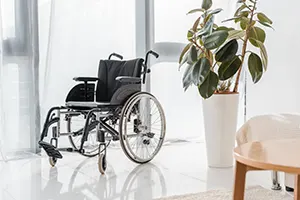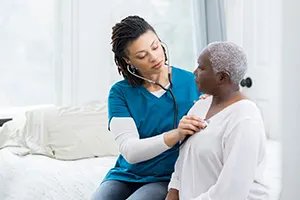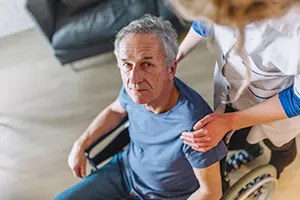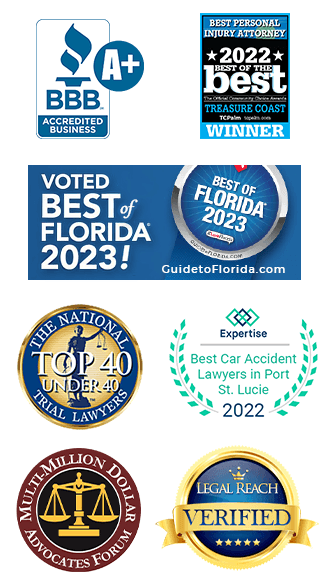

Palm Beach Gardens Nursing Home Abuse Lawyer
 It’s an appalling fact that numerous seniors and disabled adults suffer some form of abuse when entrusted to nursing homes. Florida in particular has repeatedly seen headlines about nursing home abuse and neglect that resulted in injuries and deaths. Our nursing home abuse lawyer in Palm Beach Gardens out that official numbers do not even include numerous unreported cases where victims do not realize they are being abused or are unwilling to report it.
It’s an appalling fact that numerous seniors and disabled adults suffer some form of abuse when entrusted to nursing homes. Florida in particular has repeatedly seen headlines about nursing home abuse and neglect that resulted in injuries and deaths. Our nursing home abuse lawyer in Palm Beach Gardens out that official numbers do not even include numerous unreported cases where victims do not realize they are being abused or are unwilling to report it.
If you believe that your loved one is being abused, mistreated, or neglected in a Florida facility, contact Philip DeBerard, Injury Attorney. The DeBerard team is a highly reputed firm serving South Florida, and we’re well-equipped to protect your loved one’s rights and yours. We ensure the resident is safe as we find the optimum strategies to hold the defendant accountable and obtain monetary compensation for your losses.

Is There a Deadline for Filing a Nursing Home Abuse Lawsuit in Palm Beach Gardens?
Under Florida’s Statute of Limitations, you have only two years to sue for abuse or neglect at a nursing home, which starts on the most recent abuse incident date. Though two years seems like ample time to initiate a lawsuit, it’s crucial to take action early by getting an attorney to preserve evidence.
Signs of Nursing Home Abuse
 Could your beloved elder be abused while residing at a facility? Look out for the following red flags that commonly indicate the resident has suffered abuse or neglect (We talk more on various categories of abuse further below):
Could your beloved elder be abused while residing at a facility? Look out for the following red flags that commonly indicate the resident has suffered abuse or neglect (We talk more on various categories of abuse further below):
- Odd bruises, abrasions, marks on skin, burns, or broken bones
- Multiple falling accidents
- Bed sores or other infections
- Poor hygiene
- Weight loss
- Withdrawn personality
- Irritability
- Sudden unaccountable changes in financial accounts.
When you see these indicators of nursing home abuse, you should contact an attorney as soon as you can. Here at Philip DeBerard, Injury Attorney, we first ascertain whether your loved one has to have emergency interventions, and if they do, we’ll make sure your loved one gets those. We’ll also guide you on your options under the law to demand accountability from the staff or management, and to claim the compensation for your family’s losses. Get in touch with us today to get your free consultation.
Where to Report Nursing Home Abuse in Palm Beach Gardens
 If the victim needs emergency medical care or law enforcement, call 911 right away.
If the victim needs emergency medical care or law enforcement, call 911 right away.
In Florida, we have the Agency for Health Care Administration (AHCA) to regulate, inspect, and license nursing homes, assisted living facilities (ALFs), and other long-term care facilities. If you wish to file a complaint involving a Palm Beach Gardens provider, you may file with AHCA by calling 1-888-419-3456 or 800-955-8771, or by filling out their online complaint form.
We also have the Florida Long-Term Care Ombudsman Program which tries to resolve healthcare facility complaints. You may reach them at 1-850-414-2323.
While it’s helpful to raise a complaint with these authorities, they are not the legal channel to be compensated for your medical costs, therapy costs, pain and suffering, and similar losses. To demand compensation, you’ll need to file a civil matter against the wrongful party. Let us help you with this procedure. Our experienced nursing home abuse attorneys in Palm Beach Gardens can be your advocate to help you gain back what you deserve.
Types of Elder Abuse
 Abuse can be physical, emotional, sexual, or financial. Neglect of the vulnerable adult can also be considered abuse. Here’s how these types of abuse can occur at nursing homes, and what symptoms to look out for.
Abuse can be physical, emotional, sexual, or financial. Neglect of the vulnerable adult can also be considered abuse. Here’s how these types of abuse can occur at nursing homes, and what symptoms to look out for.
Physical Abuse
Examples are striking, slapping, punching, or kicking a resident. Restraints that are injurious may also be considered this category. Be aware of signs such as:
- Unexplained bruises, scars, welts, or cuts
- Fractures or sprains
- Bedsores
- Injuries or illnesses that don’t coincide with the staff’s explanation.
Emotional Abuse
A resident may develop trauma if they experience swearing, shouting, intimidation, or humiliation from personnel. Some substandard facilities may also place a resident in confinement or isolation as a form of punishment. Signs of emotional abuse can be harder to see. Be sensitive to your loved one’s:
- Sudden behavior changes
- Lost interest in usual pastimes
- Anxiety or agitation
- Withdrawn personality
- Gloomy moods.
Sexual Abuse
Even without the occurrence of sexual assault or rape, sexual abuse can be non-consensual touching of intimate body parts, showing of sexual media, and forced nudity. Indications of sexual abuse can include physical and emotional warning signs such as:
- Unexplained bruises or markings
- Genital sores
- Unexplainable sexually transmitted diseases
- Flinching when being touched
- Becoming withdrawn.
Financial Abuse
This type of abuse is when a caregiver exploits a vulnerable adult’s assets for personal gain. This often includes coercion or manipulation of the resident. Signs of financial abuse include:
- Strange transactions using the resident’s money account
- Disappeared cash or possessions
- Sudden transfer of assets from the resident
- Unpaid bills
- Sudden changes in the resident’s estate plan or will.
Nursing Home Neglect
This refers to deficient or incorrect care of the facility’s residents. Common examples include lack of mobility assistance for impaired residents, not administering medication as required, too little cleaning or sanitation, failing to address falling accidents, and failing to contact a doctor when necessary. If your loved one has been neglected, they may manifest symptoms like:
- Bedsores (these lesions or wounds can develop if an impaired resident does not get regular repositioning by staff)
- Untreated infections
- Several falls that are unaddressed (nursing homes and ALFs must update a resident’s care plan once they suffer a fall, in order to avoid subsequent falls)
- Weight loss, dehydration, or malnutrition
- Bad hygiene or unsanitary living quarters
- Elopement (exiting the facility without supervision).
Some at Greater Risk of Suffering Nursing Home Abuse
 Lamentably, certain groups of adults could be more exposed to abuse precisely because they’re in a vulnerable state. One study showed that older adults with dementia, Alzheimer’s, or other cognitive disorder are at risk the most – their abuse rate is nearly five times that of people their age without dementia. This study also noted that people older than 80 face a higher risk for abuse than younger individuals.
Lamentably, certain groups of adults could be more exposed to abuse precisely because they’re in a vulnerable state. One study showed that older adults with dementia, Alzheimer’s, or other cognitive disorder are at risk the most – their abuse rate is nearly five times that of people their age without dementia. This study also noted that people older than 80 face a higher risk for abuse than younger individuals.
In addition, there is a wealth of research highlighting the increase in abuse risk for socially isolated persons. Without the constant company of family around them, people in nursing homes get very little support network which can ideally help recognize when abuse occurs. And when family does visit, abuse victims commonly feel too ashamed, embarrassed, or fearful to tell someone about their experiences.
It’s essential for family members to be perceptive of the symptoms of nursing home abuse. Even if you are unsure about what’s happening, it’s wise to consult a knowledgeable attorney to help you identify your best next steps.
Who Could Be Responsible in Elder Abuse
 Various parties could be responsible for nursing home abuse. In many cases, several parties are deemed liable to pay for the injury or death they caused. Below are persons or companies that may be culpable in elder abuse cases:
Various parties could be responsible for nursing home abuse. In many cases, several parties are deemed liable to pay for the injury or death they caused. Below are persons or companies that may be culpable in elder abuse cases:
- The facility’s personnel or staff
- Nurse’s aides
- Business owner
- Facility administrator
- Licensee of the particular location
- Nursing home contractor or supplier
- Doctors or therapists.
When you’re making a claim against well-resourced defendants, pursuing a nursing home abuse claim can be extremely challenging. You will likely face dominant insurance companies and even defense lawyers shielding the culpable party. To level the playing field, enlist a dependable nursing home abuse attorney in Palm Beach County with proven experience handling such claims. In South Florida, Philip DeBerard, Injury Attorney is among the most trusted firms,, and we are here for you.
Get in Touch with Philip DeBerard, Nursing Home Abuse Attorney in Palm Beach County
Voted the Treasure Coast’s top personal injury attorney by TCPalm, Philip DeBerard, Injury Attorney is consistent as an effective advocate for South Floridians. The DeBerard office has been serving Palm Beach Gardens for 40 years, obtaining millions of dollars for families and individuals who suffered from the fault of others. Talk to us about your potential case of nursing home abuse. Schedule a free consultation by dialing 1-800-299-8878 today.
Injured?
Request A Free Case Evaluation




